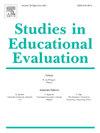拉丁美洲的学校表现与机会不平等
IF 2.6
2区 教育学
Q1 EDUCATION & EDUCATIONAL RESEARCH
引用次数: 0
摘要
本研究调查了拉丁美洲15-16岁学生教育成果的主要决定因素,旨在确定各国之间的差异。为了实现这一目标,我们使用教育生产函数和多层次回归对2018年国际学生评估项目(PISA)的数据进行了检查,同时考虑了学校产生的影响、学生及其家庭的特征,以及教学实践和学习环境动态等校内过程变量。研究结果不仅显示了拉美国家在学校表现上的差异,还显示了学生成绩不佳和面临的不安全感使他们的学习成绩恶化。另一方面,在大中型城市的学校学习可以提高学生在技能测试中的表现。此外,家庭背景对学生的学习成绩有显著影响,这表明拉丁美洲国家存在着严重的机会不平等。结果表明,除了社会经济和学校相关因素外,过程变量在解释学习成绩方面也起着相关作用:积极的课堂气氛和适应性教学与更高的成绩相关,特别是在阅读和数学方面,而对教师反馈的负面看法与较低的成绩相关,特别是在更弱势的学生中。本文章由计算机程序翻译,如有差异,请以英文原文为准。
School performance and inequality of opportunities in Latin America
This research investigates the main determinants of educational outcomes for students aged 15–16 in Latin America, aiming to identify differences among countries. To achieve this, data from the 2018 Programme for International Student Assessment (PISA) were examined using the education production function and multilevel regression, considering both the impacts created by schools and the characteristics of students and their families, as well as in-school process variables such as instructional practices and learning environment dynamics. Not only do the results show differences in school performance in Latin American countries, but also that failing grades and insecurity faced by the students worsen school performance. On the other hand, studying at a school located in a medium-to-large city increases students' performance in the skills tested. Moreover, family background has a significant impact on students' academic performance, suggesting profound inequalities of opportunities in Latin American countries. The results show that, in addition to socioeconomic and school-related factors, process variables play a relevant role in explaining academic performance: a positive classroom climate and adaptive instruction are associated with higher performance, especially in reading and mathematics, while negative perceptions of teacher feedback correlate with lower performance, particularly among more disadvantaged students.
求助全文
通过发布文献求助,成功后即可免费获取论文全文。
去求助
来源期刊

Studies in Educational Evaluation
Multiple-
CiteScore
6.90
自引率
6.50%
发文量
90
审稿时长
62 days
期刊介绍:
Studies in Educational Evaluation publishes original reports of evaluation studies. Four types of articles are published by the journal: (a) Empirical evaluation studies representing evaluation practice in educational systems around the world; (b) Theoretical reflections and empirical studies related to issues involved in the evaluation of educational programs, educational institutions, educational personnel and student assessment; (c) Articles summarizing the state-of-the-art concerning specific topics in evaluation in general or in a particular country or group of countries; (d) Book reviews and brief abstracts of evaluation studies.
 求助内容:
求助内容: 应助结果提醒方式:
应助结果提醒方式:


